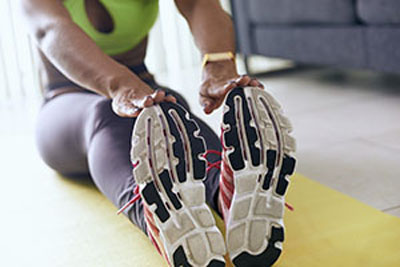Causes of Cracked Heels
Monday, 06 July 2020 00:00 Cracked heels or heel fissures are a common foot condition that can cause discomfort and sometimes pain. The first sign of cracked heels is having areas of dry, thickened skin, known as calluses, around the rim of your heel. As you walk the fat pad under your heel expands, causing the calluses to crack. Some factors for cracked heels to develop can be weight gain or obesity, standing on hard surfaces for extended periods of time, and open back shoes that do not provide adequate support for the heel of the foot. Most of the time cracked heels don't really hurt, but as the cracks deepen, they may bleed or cause standing and walking to become painful. To prevent cracked heels, it is recommended to apply a good moisturizer to the feet daily. Patients with diabetes should check their feet regularly, if the fissures go unnoticed, they could turn into diabetic foot ulcers. If your cracked heels are severe, it is suggested that you seek the counsel of a podiatrist who can guide you towards correct treatment options.
Cracked heels or heel fissures are a common foot condition that can cause discomfort and sometimes pain. The first sign of cracked heels is having areas of dry, thickened skin, known as calluses, around the rim of your heel. As you walk the fat pad under your heel expands, causing the calluses to crack. Some factors for cracked heels to develop can be weight gain or obesity, standing on hard surfaces for extended periods of time, and open back shoes that do not provide adequate support for the heel of the foot. Most of the time cracked heels don't really hurt, but as the cracks deepen, they may bleed or cause standing and walking to become painful. To prevent cracked heels, it is recommended to apply a good moisturizer to the feet daily. Patients with diabetes should check their feet regularly, if the fissures go unnoticed, they could turn into diabetic foot ulcers. If your cracked heels are severe, it is suggested that you seek the counsel of a podiatrist who can guide you towards correct treatment options.
Cracked heels are unsightly and can cause further damage to your shoes and feet. If you have any concerns, contact John Killough, DPM from Regional Foot Center. Our doctor can provide the care you need to keep you pain-free and on your feet.
Cracked Heels
Cracked heels appear unappealing and can make it harder for you walk around in sandals. Aside from looking unpleasant, cracked heels can also tear stockings, socks, and wear out your shoes. There are several methods to help restore a cracked heel and prevent further damage.
How Do You Get Them?
Dry skin is the number one culprit in creating cracked heels. Many athletes, walkers, joggers, and even swimmers suffer from cracked heels. Age and skin oil production play a role to getting cracked heels as well.
Promote Healing
Over the counter medicines can help, especially for those that need instant relief or who suffer from chronic dry feet.
Wear Socks – Wearing socks with medicated creams helps lock in moisture.
Moisturizers – Applying both day and night will help alleviate dryness which causes cracking.
Pumice Stones – These exfoliate and remove dead skin, which allows for smoother moisturizer application and better absorption into the skin.
Change in Diet
Eating healthy with a well-balanced diet will give the skin a fresh and radiant look. Your body responds to the kinds of food you ingest. Omega-3 fatty acids and zinc supplements can also revitalize skin tissue.
Most importantly, seek professional help if unsure how to proceed in treating cracked heels. A podiatrist will help you with any questions or information needed.
If you have any questions, please feel free to contact our offices located in Charleston and Effingham, IL . We offer the newest diagnostic and treatment technologies for all your foot care needs.




